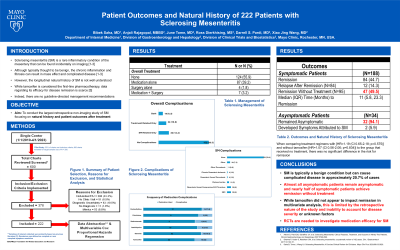Monday Poster Session
Category: Small Intestine
P3187 - Patient Outcomes and Natural History of 222 Patients with Sclerosing Mesenteritis
Monday, October 28, 2024
10:30 AM - 4:00 PM ET
Location: Exhibit Hall E

Has Audio

Bibek Saha, MD
Mayo Clinic
Rochester, MN
Presenting Author(s)
Award: Presidential Poster Award
Bibek Saha, MD, Anjali Rajagopal, MBBS, June Tome, MD, Ross Dierkhising, MS, Darrell S. Pardi, MD, MS, Xiao Jing (Iris) Wang, MD
Mayo Clinic, Rochester, MN
Introduction: Sclerosing mesenteritis (SM) is a rare inflammatory condition of the mesentery that can be found incidentally on imaging. Although typically thought to be benign, the chronic inflammation and fibrosis can result in mass effect and complicated disease. The longitudinal natural history of SM is not well understood. While tamoxifen is the first-line pharmacotherapy, data regarding its efficacy for disease remission is scarce. We present the largest retrospective non-imaging study of SM focusing on natural history and patient outcomes after treatment.
Methods: After Institutional Review Board approval, a retrospective chart review for SM was performed between 1/1/2010-6/30/2023. Remission was defined as complete or near complete symptom resolution where the patient was followed from date of diagnosis until the last date SM was discussed. Multivariable Cox proportional hazards regression was used to estimate the association of treatment with remission in symptomatic patients.
Results: A total of 222 cases met the inclusion criteria (adequate follow-up and accurate diagnosis). Of the 34 patients who were initially asymptomatic, only 3 received treatment and 32 (94.1%) remained asymptomatic. The majority of patients (55.9%) did not receive any treatment and 39.2% were managed with medication alone (Table 1). Among all symptomatic patients (n=188), 84 (44.7%) achieved remission with 12 of the 84 (14.3%) developing symptom recurrence. Of those who were symptomatic but did not receive treatment, 49.5% had symptom resolution. When comparing treatment regimens with [HR=1.19 (Cl 0.65-2.18; p=0.575)] and without tamoxifen [HR=1.07 (Cl 0.56-2.06; p=0.834)] to the group that received no treatment, there was no significant difference in the risk for remission. Overall, 14.4%, 10.8%, and 6.3% of patients experienced complications related to SM, the treatment, or both, respectively.
Discussion: SM is typically a benign condition but can cause complicated disease in approximately 20.7% of cases. Nearly half (49.5%) of symptomatic patients achieve remission without treatment. While tamoxifen did not appear to impact remission in multivariate analysis, this is limited by the retrospective nature of the study and inability to account for disease severity or unknown factors. Randomized-controlled trials are needed to investigate medication efficacy for SM.
Note: The table for this abstract can be viewed in the ePoster Gallery section of the ACG 2024 ePoster Site or in The American Journal of Gastroenterology's abstract supplement issue, both of which will be available starting October 27, 2024.
Disclosures:
Bibek Saha, MD, Anjali Rajagopal, MBBS, June Tome, MD, Ross Dierkhising, MS, Darrell S. Pardi, MD, MS, Xiao Jing (Iris) Wang, MD. P3187 - Patient Outcomes and Natural History of 222 Patients with Sclerosing Mesenteritis, ACG 2024 Annual Scientific Meeting Abstracts. Philadelphia, PA: American College of Gastroenterology.
Bibek Saha, MD, Anjali Rajagopal, MBBS, June Tome, MD, Ross Dierkhising, MS, Darrell S. Pardi, MD, MS, Xiao Jing (Iris) Wang, MD
Mayo Clinic, Rochester, MN
Introduction: Sclerosing mesenteritis (SM) is a rare inflammatory condition of the mesentery that can be found incidentally on imaging. Although typically thought to be benign, the chronic inflammation and fibrosis can result in mass effect and complicated disease. The longitudinal natural history of SM is not well understood. While tamoxifen is the first-line pharmacotherapy, data regarding its efficacy for disease remission is scarce. We present the largest retrospective non-imaging study of SM focusing on natural history and patient outcomes after treatment.
Methods: After Institutional Review Board approval, a retrospective chart review for SM was performed between 1/1/2010-6/30/2023. Remission was defined as complete or near complete symptom resolution where the patient was followed from date of diagnosis until the last date SM was discussed. Multivariable Cox proportional hazards regression was used to estimate the association of treatment with remission in symptomatic patients.
Results: A total of 222 cases met the inclusion criteria (adequate follow-up and accurate diagnosis). Of the 34 patients who were initially asymptomatic, only 3 received treatment and 32 (94.1%) remained asymptomatic. The majority of patients (55.9%) did not receive any treatment and 39.2% were managed with medication alone (Table 1). Among all symptomatic patients (n=188), 84 (44.7%) achieved remission with 12 of the 84 (14.3%) developing symptom recurrence. Of those who were symptomatic but did not receive treatment, 49.5% had symptom resolution. When comparing treatment regimens with [HR=1.19 (Cl 0.65-2.18; p=0.575)] and without tamoxifen [HR=1.07 (Cl 0.56-2.06; p=0.834)] to the group that received no treatment, there was no significant difference in the risk for remission. Overall, 14.4%, 10.8%, and 6.3% of patients experienced complications related to SM, the treatment, or both, respectively.
Discussion: SM is typically a benign condition but can cause complicated disease in approximately 20.7% of cases. Nearly half (49.5%) of symptomatic patients achieve remission without treatment. While tamoxifen did not appear to impact remission in multivariate analysis, this is limited by the retrospective nature of the study and inability to account for disease severity or unknown factors. Randomized-controlled trials are needed to investigate medication efficacy for SM.
Note: The table for this abstract can be viewed in the ePoster Gallery section of the ACG 2024 ePoster Site or in The American Journal of Gastroenterology's abstract supplement issue, both of which will be available starting October 27, 2024.
Disclosures:
Bibek Saha indicated no relevant financial relationships.
Anjali Rajagopal indicated no relevant financial relationships.
June Tome indicated no relevant financial relationships.
Ross Dierkhising indicated no relevant financial relationships.
Darrell Pardi: AbbVie – Consultant. Applied molecular transport – Grant/Research Support. Finch – Grant/Research Support. Immunic – Consultant. Otsuka – Consultant. Pfizer – Grant/Research Support. Phantom Pharmaceuticals – Consultant. Seres – Consultant, Grant/Research Support. Takeda – Grant/Research Support. Vedanta – Consultant, Grant/Research Support.
Xiao Jing (Iris) Wang indicated no relevant financial relationships.
Bibek Saha, MD, Anjali Rajagopal, MBBS, June Tome, MD, Ross Dierkhising, MS, Darrell S. Pardi, MD, MS, Xiao Jing (Iris) Wang, MD. P3187 - Patient Outcomes and Natural History of 222 Patients with Sclerosing Mesenteritis, ACG 2024 Annual Scientific Meeting Abstracts. Philadelphia, PA: American College of Gastroenterology.


